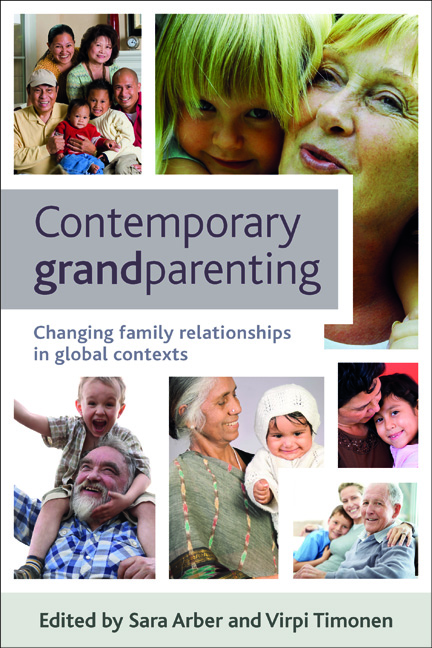twelve - Grandparenting in the 21st century: new directions
Published online by Cambridge University Press: 01 September 2022
Summary
Contemporary grandparenting is at the fulcrum of family relationships, but the nature and practices of grandparenting are very different in the 21st century than 50 years ago, and are very different today in the UK than in China or Africa. To fully understand grandparenting, it is critical to adopt a cross-national and temporal perspective, and be attuned to the impact of globalisation. The global focus of this book emphasises that cultural norms in different societies and broader societal changes have a profound impact on grandparenting. Thus, the practices of grandparenting and subjective meaning of being a grandparent vary markedly between societies and within the same societal context over time.
This book considers ‘grandparenting’ as an active and dynamic family practice, focusing on doing grandparenting. Recent literature on family practices (Morgan, 2011) points to the importance of studying everyday family behaviours. Chambers and colleagues (2009, p 6) emphasise ‘that family relationships are constructed through interactive processes of negotiation and thus involve more than a simple following of culturally accepted rules’. Thus, grandparents and other family members exercise agency in constructing their relationships with one another. Although extensive research on ‘doing family’ has examined family practices among couples and their children (Ribbens, 1994), fewer studies consider family practices among extended (and non-co-resident) family members. An exception is Chambers and colleagues (2009) who examine older parent–adult child relationships focusing on negotiated exchanges and interdependencies.
Our relational perspective emphasises grandparenting as one part of a dynamic and changing network of family relationships, in contrast to studying grandparents using a traditional role framework. Such a role framework provides a more static image of grandparent roles, one that is often seen as substantially proscribed by cultural norms of appropriate behaviour (see Chapter One).
The perspectives adopted in this book are very different from dominant policy concerns about ‘an ageing society’ and the lack of carers and resources to pay for the ‘burden’ of older people. Such a ‘social problem’ or ‘dependency’ perspective sees older people as a ‘burden’ to be cared for by their family members, especially the adult child generation (Chambers et al, 2009). A counter to this has been research on intergenerational relationships and reciprocity between generations.
- Type
- Chapter
- Information
- Contemporary GrandparentingChanging Family Relationships in Global Contexts, pp. 247 - 264Publisher: Bristol University PressPrint publication year: 2012
- 1
- Cited by



